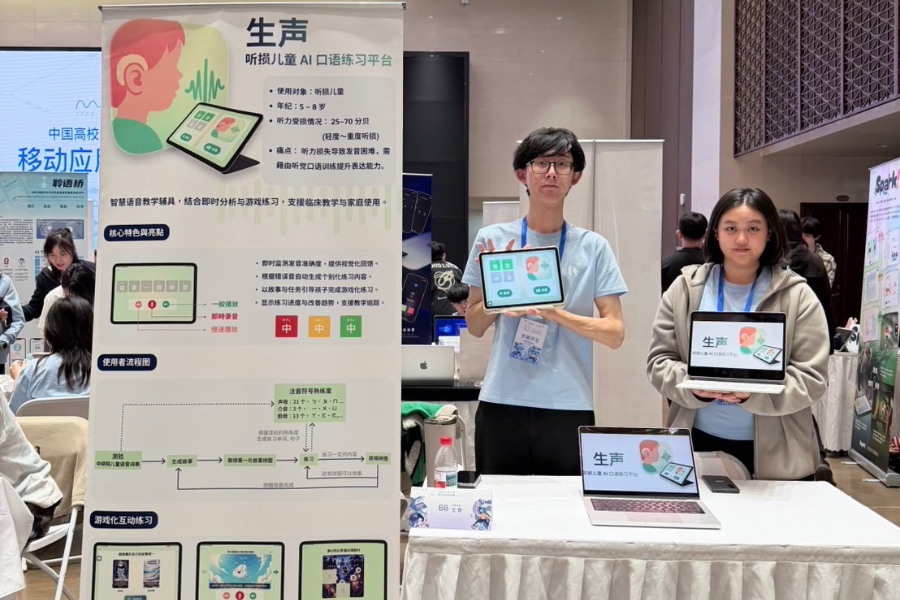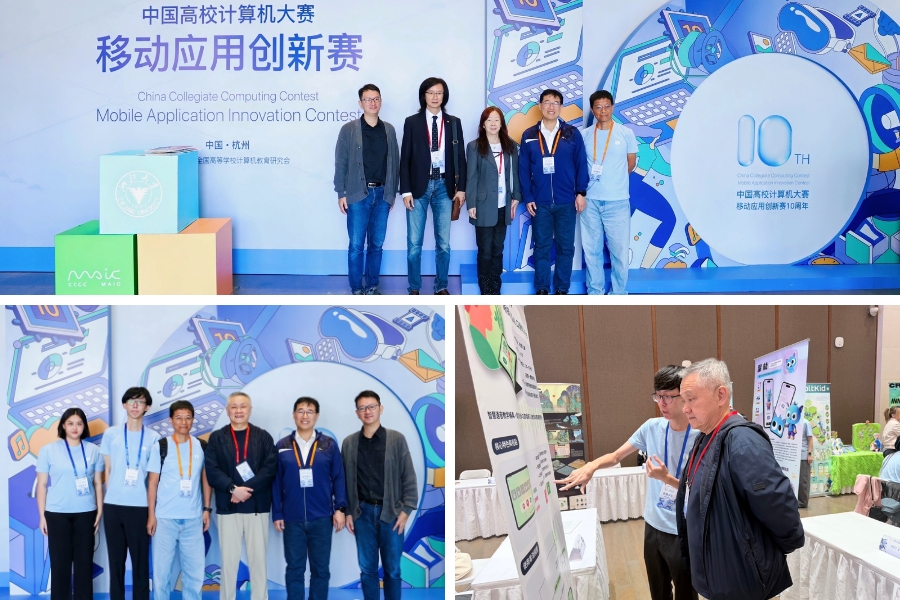


AI Gives Voice to Children with Hearing Loss: Feng Chia University’s “Sheng Sheng” Wins Second Prize in the Greater China Region at the Apple Mobile Application Innovation Competition
The 10th Apple Mobile Application Innovation Contest (MAIC) Greater China Regional Finals was held on November 2 at Zhejiang University in Hangzhou. This year’s competition attracted registrations from 4,281 teams across 1,293 universities worldwide, with only 88 teams advancing to the finals. Amid fierce competition, the “Sheng Sheng” team—composed of Li Bo-Lin from Feng Chia University’s Department of Computer Science and Engineering, Wang Yi-Ting from Hungkuang University’s Department of Speech-Language Pathology and Audiology, and Xu Shuo-Han from National Chung Hsing University’s Department of Business Administration—won the Second Prize in the Enlightenment Track with their AI speech practice platform designed specifically for children with hearing loss.

Li Bo-Lin from Feng Chia University (left) and Xu Shuo-Han from National Chung Hsing University’s Department of Business Administration represented their team in Hangzhou at the 10th Apple Mobile Application Innovation Contest Greater China Regional Finals, winning the Second Prize in the Enlightenment Track.
Under the guidance of Professor Chen Xi-Min from Feng Chia University’s Department of Computer Science and Professor Huang Hui-Chi from Hungkuang University’s Department of Speech-Language Pathology and Audiology, the “Sheng Sheng” team developed an AI-powered speech learning platform specifically designed for children aged 5–8 with hearing loss, based on the core concept of “encouraging children to speak bravely and willingly.” The platform combines speech recognition with gamified interactive exercises, helping children practice oral pronunciation at home or in clinical settings. The system can instantly monitor pronunciation accuracy and provide visual feedback, automatically generating personalized practice content based on mispronounced sounds, and uses story-based tasks and puzzle rewards to motivate learning. The platform also generates “proficiency reports” for speech therapists to plan and adjust correction courses. “Sheng Sheng” is not only an auxiliary teaching tool for therapists but also allows children to continue practicing at home after class, integrating AI technology into daily learning and helping them gradually regain confidence in speaking.Professor Chen Xi-Min expressed hope that technology can build a bridge to the world for children with hearing loss, rather than being a cold tool. The team will continue to optimize the system, enhance gamification design and practice content, making the learning process more fun and tailored to children’s needs, so that more children can benefit.Li Bo-Lin shared that this was his fifth time participating in the competition, and the first time he advanced to the Greater China finals and won the Second Prize. By forming a cross-disciplinary team with partners from different fields, he gained deeper insight into the learning needs of children with hearing loss during the development process. The team visited the Women’s Federation Hearing Health Social Welfare Foundation to conduct real-world tests with children with hearing loss, continuously refining the interface and practice content based on their reactions and feedback, making the system better suited to children’s usage habits and learning conditions.Since 2016, Feng Chia University has organized the Taiwan regional selection for the Mobile Application Innovation Contest, now in its tenth year, making it the largest and most influential iOS app development competition in Taiwan. This year, the university also received the Outstanding Organization Award, recognizing its excellence in innovative teaching and industry-academia collaboration. Feng Chia students have consistently performed well, not only achieving great results in the Greater China competition but also winning the Apple WWDC Swift Student Challenge multiple times.The contest is jointly promoted by Apple, Feng Chia University, Straight A (STUDIO A’s education brand), and the Apple Regional Training Center (RTC) at National Taiwan University. Over the past decade, STUDIO A has worked closely with academia, helping countless young students move from campus to the international stage, showcasing Taiwan’s soft power through creativity and technology.Feng Chia University stated that this award is not only the result of the team’s hard work but also reflects the school’s long-term efforts in building an innovative ecosystem. The university now has student-run technical clubs such as Google Developer Groups on Campus FCU, iOS Club, AI Club, and Hacker Club, with teachers providing guidance. Through interdisciplinary learning, project-based practice, and international competitions, students develop problem-solving skills and a global perspective. This year’s award-winning student, Li Bo-Lin, is also a member of the iOS Club, exemplifying Feng Chia’s cultivation mechanism.Feng Chia University emphasized that it will continue to deepen cooperation with STUDIO A and Straight A, encouraging teachers to lead students in international competitions, accumulating experience and innovation through hands-on practice, and making technological creation a driving force for learning and connecting with the world.
President Wang Wei of Feng Chia University, Vice President Tang Guo-Hao, Dean Shen Zu-Wang of the College of Information and Electrical Engineering, Apple RTC Director Hsu Fang-Jung, and Department of Computer Science Chair Chen Xi-Min, along with other faculty members, attended in person to witness the important milestone of the tenth anniversary of collaboration with STUDIO A and Straight A.
Share: